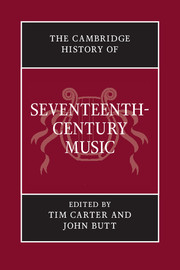Book contents
- Frontmatter
- 1 Renaissance, Mannerism, Baroque
- 2 The seventeenth-century musical ‘work’
- 3 Music in the market-place
- 4 Music in new worlds
- 5 Music and the arts
- 6 Music and the sciences
- 7 The search for musical meaning
- 8 Power and display: music in court theatre
- 9 Mask and illusion: Italian opera after 1637
- 10 The Church Triumphant: music in the liturgy
- 11 Devotion, piety and commemoration: sacred songs and oratorios
- 12 Image and eloquence: secular song
- 13 Fantasy and craft: the solo instrumentalist
- 14 Form and gesture: canzona, sonata and concerto
- Appendix I Chronology
- Appendix II Places and institutions
- Appendix III Personalia
- Index
- References
9 - Mask and illusion: Italian opera after 1637
Published online by Cambridge University Press: 28 March 2008
- Frontmatter
- 1 Renaissance, Mannerism, Baroque
- 2 The seventeenth-century musical ‘work’
- 3 Music in the market-place
- 4 Music in new worlds
- 5 Music and the arts
- 6 Music and the sciences
- 7 The search for musical meaning
- 8 Power and display: music in court theatre
- 9 Mask and illusion: Italian opera after 1637
- 10 The Church Triumphant: music in the liturgy
- 11 Devotion, piety and commemoration: sacred songs and oratorios
- 12 Image and eloquence: secular song
- 13 Fantasy and craft: the solo instrumentalist
- 14 Form and gesture: canzona, sonata and concerto
- Appendix I Chronology
- Appendix II Places and institutions
- Appendix III Personalia
- Index
- References
Summary
There are several different histories of seventeenth-century opera that might be written. One would take as its starting-point Jacopo Peri’s Euridice (libretto by Ottavio Rinuccini), staged in Florence on 6 October 1600 during the festivities for the wedding of Maria de’ Medici and Henri IV of France. Euridice has obvious roots in sixteenth-century theatrical traditions, including the intermedi, and also immediate precedents in various Florentine entertainments staged during the 1590s. Yet it remains totemic because it is the first example of the genre to survive complete. Locating the ‘beginning’ of opera in 1600 is obviously convenient: the new century coincides with what many have subsequently viewed as a new artistic era, the Baroque, and indeed, opera is often viewed as the Baroque genre par excellence. This history would also have other merits, not least because seventeenth-century (and, indeed, later) opera could not have been conceived without Peri’s invention of musical recitative, and no less important, without Rinuccini’s precedent for what quickly became standard poetic techniques for librettos.
But we could tell another, different history. The operas performed in the north Italian courts and in Rome in the first third or so of the seventeenth century formed just part of a broader gamut of princely entertainment that also embraced plays with intermedi, balli, mascherate, and various kinds of tournaments (on foot, horseback or water). Court operas were not necessarily identified as belonging to a distinct genre – given that the parameters of such works remained in flux – and indeed few courts appreciated them specifically as music-dramas.
- Type
- Chapter
- Information
- The Cambridge History of Seventeenth-Century Music , pp. 241 - 282Publisher: Cambridge University PressPrint publication year: 2005
References
- 1
- Cited by



